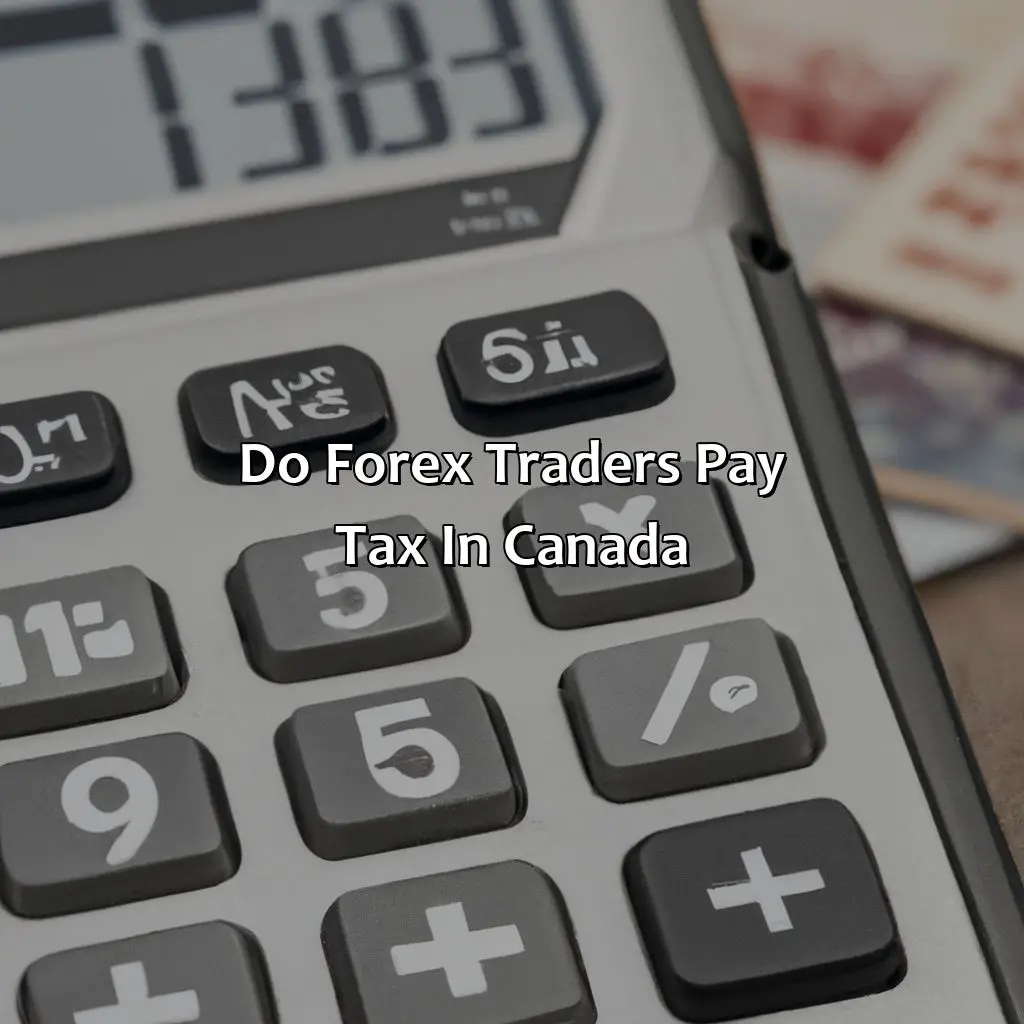
Key Takeaway:
- Forex trading is popular in Canada: Forex trading is the exchange of foreign currencies with the aim of making a profit, and it is a popular investment choice for Canadians due to the potential for high returns.
- Forex traders in Canada are subject to tax regulations: The Canadian Revenue Agency (CRA) considers forex trading as a taxable event and requires forex traders to report any taxable gain or loss. Forex traders in Canada must also understand the tax implications of investing in foreign currency, capital gains tax, and the tax-free savings account (TFSA) and registered retirement savings plan (RRSP).
- Forex traders in Canada can minimize tax liability with careful planning: By seeking professional tax advice, keeping accurate records, and following tax regulations, forex traders in Canada can minimize their tax liability and maximize their profits.
Overview of Forex Trading in Canada
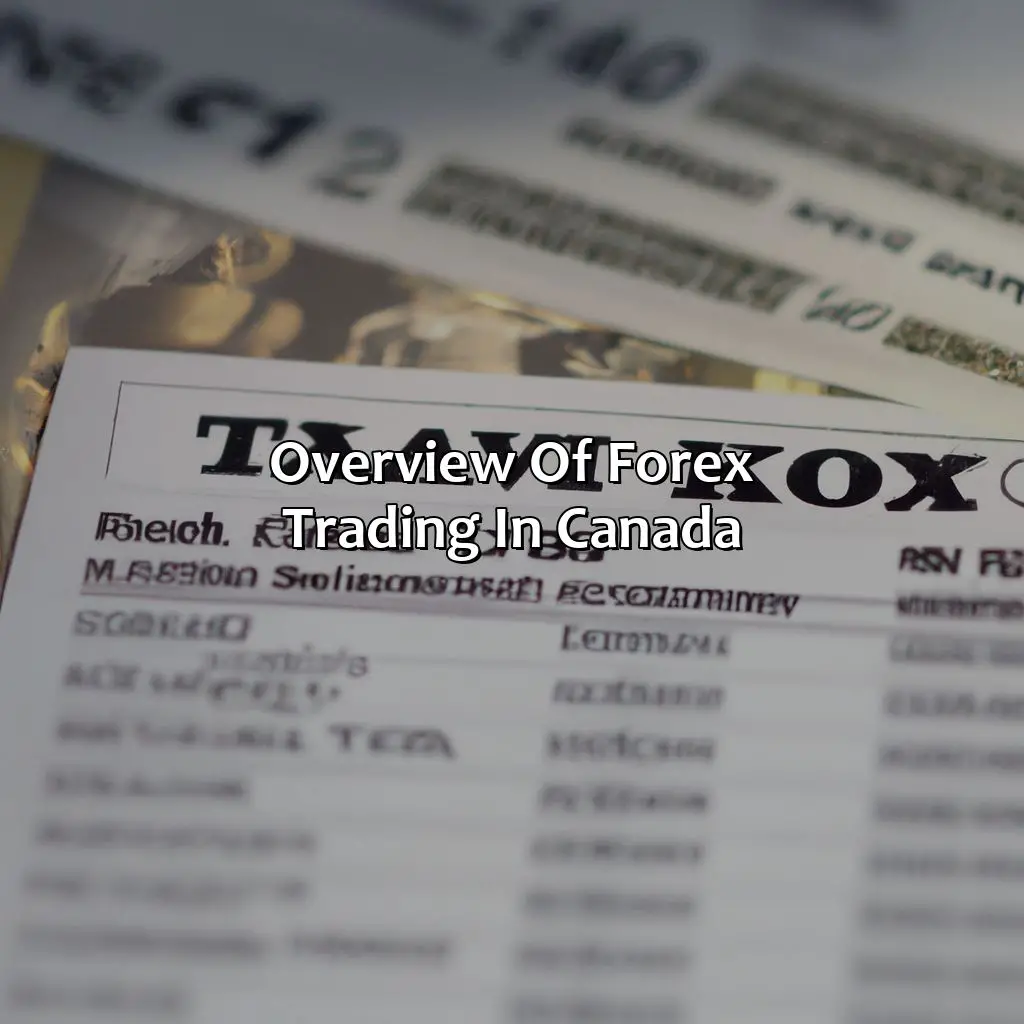
Photo Credits: forexbrokerreport.com by Stephen Thompson
Forex trading in Canada involves the buying and selling of different currency pairs. Forex traders in Canada must adhere to the regulations set by the Investment Industry Regulatory Organization of Canada (IIROC). Forex trading can be done through a broker or online. It is important to understand investment strategies and risks involved in currency trading. The stock market and foreign exchange markets are not the same and require different strategies.
Some unique details about forex trading in Canada include the fact that there are different tax implications for traders depending on whether they are considered investors or traders by Canada Revenue Agency. If traders are considered investors, they may be subject to capital gains tax. On the other hand, if they are classified as traders, they may have to pay income tax.
According to the Bank of Canada, as of September 2021, the Canadian dollar was the seventh most traded currency in the world.
Overall, forex traders in Canada must follow the rules and regulations set by the IIROC and be aware of the risks and tax implications of their trading activities. It is important to keep up with any changes or updates in the industry to make informed investment decisions.
Understanding Tax Regulations for Forex Traders in Canada
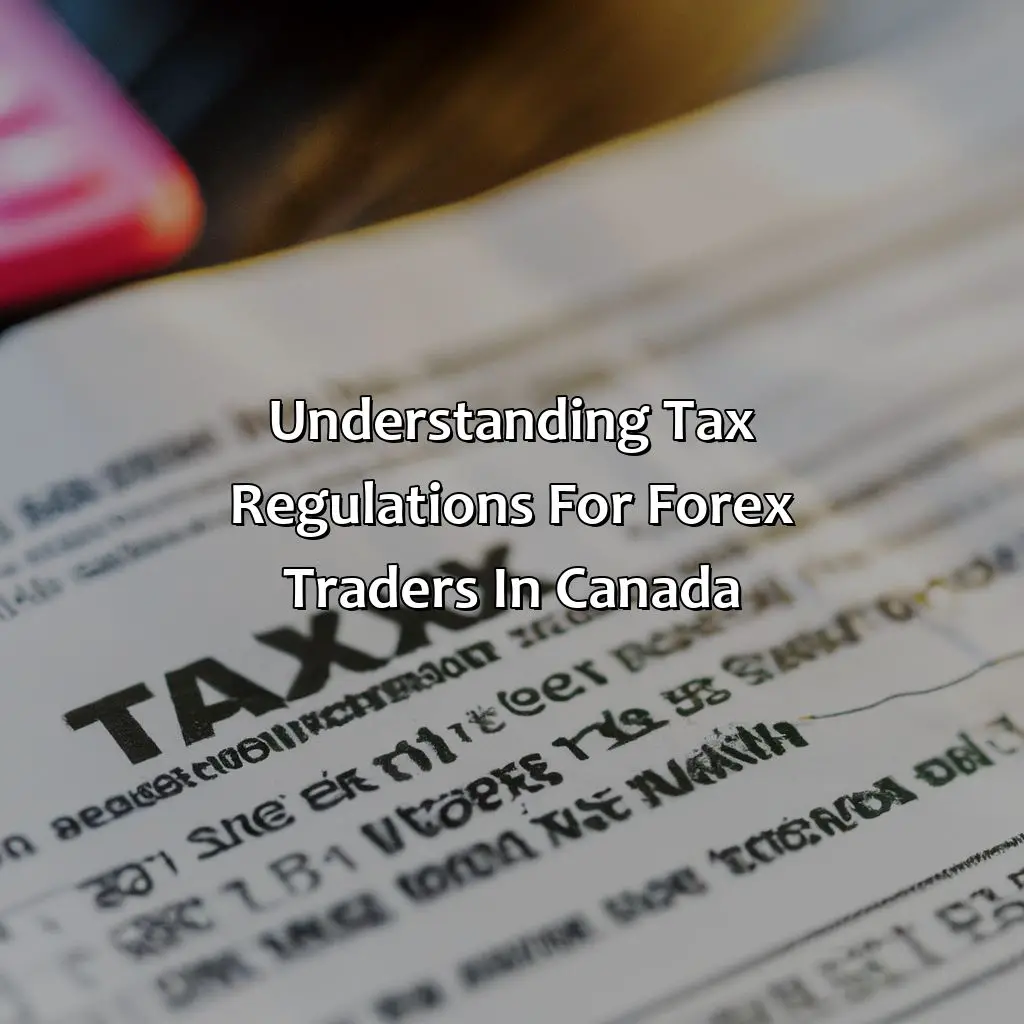
Photo Credits: forexbrokerreport.com by Ralph Lewis
To understand the tax regulations for forex traders in Canada, we must comply with the CRA and meet our obligations. Doing this helps reduce our tax liability. We will discuss Canadian tax laws for individuals and businesses. We will look at different categories of income for forex traders, such as profits, losses, and taxable benefits. Additionally, we will analyze capital gains and losses taxes. This includes calculations, rates, and refunds. Lastly, we will explore deductible expenses, exemptions, and tax-efficient investments. This helps manage risks and reduces our tax burden.
Canadian Tax Laws for Individuals and Businesses
The Income Tax Act of Canada applies tax laws to both individuals and businesses. These tax regulations include personal taxation, business taxation, and federal tax legislation with specific rules and guidelines. Understanding Canadian tax laws is important for forex traders as it has significant tax implications. The Canada Revenue Agency (CRA) provides guidance on the applicability of these regulations to foreign currency transactions.
For individuals, Canadian tax laws apply to their worldwide income. Business taxation depends on the type of business structure, such as sole proprietorship, partnership or corporation. Tax exemptions for investments, credits for taxes paid in other countries, income splitting opportunities are some of the ways that businesses can optimize their taxes.
Income derived from forex trading falls under different categories like business income or capital gains. Forex traders should report their trading income regularly and accurately in accordance with CRA guidelines. Additionally, when disposing of capital assets like currency pairs, capital gain/loss taxes may be applicable. They can also claim expenses stemming from their business operations to minimize their taxable income.
Forex traders need to maintain proper records and documents pertaining to their trades and expenses during the year for accurate reporting at year-end. Filing deadlines depend on the type of forex trader’s filing status – self-employed or not – but generally follow standard income tax deadlines.
Seeking professional tax advice can help ensure that forex traders make informed decisions regarding taxes based on their unique situation. Tax planning strategies like incorporating a company or opening a registered retirement savings plan (RRSP) can help minimize tax liabilities while building wealth.
Investing in forex can bring profits or losses, but the Canadian government will make sure to tax both.
Categories of Income for Forex Traders
Forex trading in Canada can generate different types of income for traders. It’s vital to understand the categories of income as it affects tax regulations. As a forex trader, you may have investment income, losses, profitable trades and taxable dividends.
Using a table, let us examine the categories of income for forex traders in Canada:
| Categories of Income | Description |
|---|---|
| Capital gains | Income accrued from selling assets like stocks or commodities at a higher price than when you bought them |
| Business income | Income gained mainly from regular activities with clients or customers for profit-making purposes |
| Employment income | Payment received by employed individuals for their work in a company or organization |
| Investment income | Earnings made on investments such as stocks, bonds, mutual funds, etc. |
| Taxable benefits | Benefits provided by an employer that are considered taxable |
In addition to profits and investment earnings, forex traders also need to report all other sources of Canadian-source income that they may receive during the tax year. These can include employment earnings, rental property revenue and self-employment earnings.
A forex trader must keep detailed records of all transactions and expenses throughout the year so as not to miss out on any deductions come tax season.
As an example story: John is a forex trader based in Toronto who had an overall loss on his trading account last year. Despite making no profits, John still needed to declare his net losses in his tax return for offsetting against other forms of taxable gain.
No matter your tax bracket, always remember: capital gains may be taxable, but so is your sense of humor.
Taxes on Capital Gains and Losses
Profits and losses incurred from forex trading are subject to taxation in Canada. Forex traders need to understand the tax regulations regarding capital gains and losses. Capital gains refer to profits made from selling or disposing of capital property, while capital losses are incurred when the selling price is less than the original purchase price.
Forex traders’ capital gains are considered as taxable income and must be included in their total income for tax calculations. The tax bracket that a trader falls under determines the applicable tax rate on their capital gains. Capital losses can either be offset against capital gains or carried forward to future years.
Deductible expenses for forex traders can reduce their taxable income and overall tax liability. These expenses include internet, phone bills, computer equipment, and other necessary costs incurred during trading activities.
Forex traders must keep detailed records of all trades, including dates, amounts, and any associated fees or charges. This information must be submitted accurately on their tax returns to avoid penalties or fines from Revenue Canada.
It’s important for forex traders to seek professional advice when filing taxes as a mistake could result in an audit from Revenue Canada. Tax planning strategies such as utilizing registered retirement savings plans (RRSPs) can also help minimize tax liabilities.
In summary, understanding the regulations surrounding taxes on capital gains and losses is vital for forex traders. By keeping detailed records of trades and using available tax credits and deductions, traders can maximize tax refunds while minimizing overall tax liability.
Not all heroes wear capes, but forex traders in Canada can deduct expenses for tax efficiency and risk management.
Deductible Expenses for Forex Traders
Forex traders in Canada can reduce their tax liability by claiming deductions and exemptions on expenses incurred. These expenses not only include trading-related costs, but also tax-efficient investments and risk management strategies. By doing so, traders can minimize their tax burden and maximize their profits while staying compliant with relevant tax regulations.
- Trading-related expenses such as brokerage fees, platform subscriptions, research resources, and education costs are deductible.
- Tax-efficient investments such as individual pension plans (IPPs) and Tax-Free Savings Accounts (TFSAs) can offset capital gains taxes.
- Costs associated with risk management strategies like hedging or stop-loss orders may also be deductible.
- Home office expenses, travel costs related to trading activities, and professional services fees like accounting or legal advice may also be eligible for deduction.
It is important to note that while certain deductions can lower a trader’s overall tax liability, they may also increase the likelihood of being audited or raising suspicion from the Canadian Revenue Agency (CRA). Traders should seek professional tax advice to ensure compliance with all relevant regulations.
It is a fact that forex traders in Canada must keep detailed records of all transactions and expenses for at least six years in order to accurately report their income when filing taxes.
Navigating the tax implications of forex trading in Canada can be daunting, but proper record keeping and seeking professional advice can keep CRA penalties at bay.
How to File Taxes as a Forex Trader in Canada
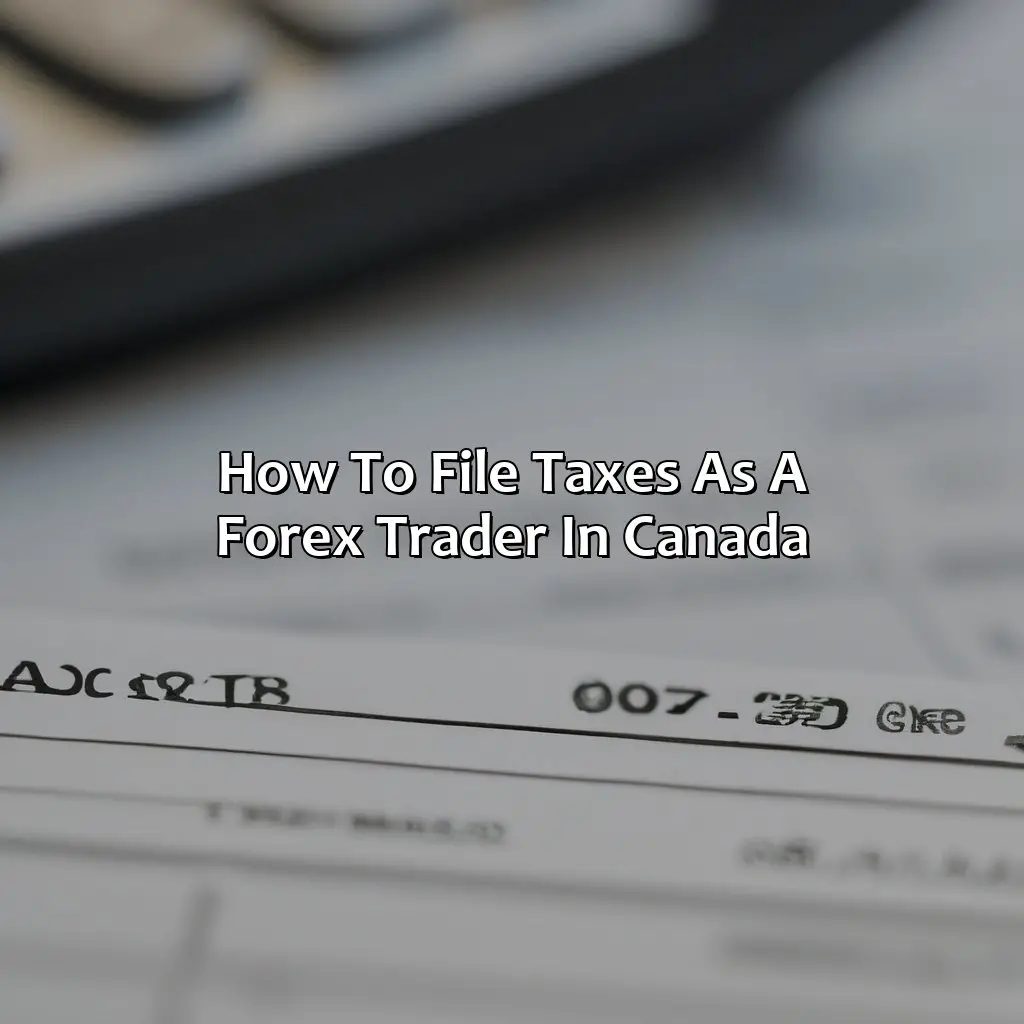
Photo Credits: forexbrokerreport.com by Gabriel Perez
As a forex trader in Canada, you need to track your trades. This helps you meet CRA audits and understand the tax implications. Reporting income is vital. Knowing the taxable income threshold is important. Late payments can get you fined. So, be aware of deadlines, non-resident tax obligations, and foreign tax paid. This section covers:
- record-keeping
- reporting income on tax returns
- tax filing deadlines for forex traders
Record Keeping Requirements for Forex Traders
Forex traders must comply with strict Canadian record-keeping requirements to avoid issues during CRA audits. Traders must retain documents that substantiate their financial transactions and forex trades for at least six years. These records detail a trader’s financial position, including income statements, balance sheets, and cash flow statements. Additionally, traders are required to keep track of all trading costs, fees paid to brokers, and relevant market data.
Record keeping is essential for tax compliance as traders need to accurately report their income and expenses. Failing to keep records can result in penalties and fines assessed by the CRA during audits. Proper documentation can help demonstrate that transactions were conducted in good faith in case of any disputes.
It is important to note that record-keeping requirements vary based on individual circumstances such as business structure and tax classification. Therefore, forex traders must carefully review all applicable tax laws and seek professional advice if required.
Accordingly, forex trading comes with significant responsibilities regarding tax compliance in Canada. It is essential for traders to maintain detailed records of financial transactions to avoid potential legal consequences following a CRA audit.
Don’t let the taxable income threshold catch you off guard when reporting your forex trading income on tax returns in Canada.
Reporting Forex Trading Income on Tax Returns
When it comes to reporting your forex trading income on tax returns in Canada, it is crucial to accurately calculate and declare all profits and losses. This is because the Canada Revenue Agency (CRA) requires all individuals and businesses to report their income derived from all sources, including forex trading.
To ensure compliance with CRA regulations, forex traders must report their net income from forex trading activities as part of their personal or business tax return filings. This can be done by filling out Form T2125 for self-employed individuals or professional traders and Form T1 for individual traders.
When reporting forex trading income on tax returns, traders must provide a breakdown of their profits and losses by category, including capital gains/losses, business income/losses, and other sources of income such as employment or investment.
It is important to note that if your annual net taxable income exceeds the taxable income threshold established by the CRA for a given year ($12,298 for 2021), you will be required to pay taxes on your forex trading activity. Furthermore, failure to report the correct amount of income may result in penalties imposed by the CRA.
In summary, ensuring accurate recordkeeping and proper reporting of forex trading income is crucial for compliance with Canadian tax laws. By staying informed about regulations and seeking professional tax advice when necessary, traders can minimize their tax liability while staying compliant with the law.
Don’t be fashionably late with your tax filings as a forex trader in Canada, or you’ll face some not-so-fashionable late payment penalties.
Tax Filing Deadlines for Forex Traders
Forex traders in Canada must adhere to specific tax filing deadlines. Failing to meet these deadlines can lead to late payment penalties. Such fines could be avoided by submitting tax returns as required.
Traders must file their tax returns on or before April 30th of every year, including any taxes they owe for the previous fiscal year, which runs from January 1st to December 31st. Self-employed income earners have until June 15th to file but are still expected to pay taxes owed before the April 30th deadline.
Moreover, it is necessary to adhere to such requirements lest running into issues with the Canadian Revenue Agency (CRA). The CRA imposes a severe penalty for late payment of taxes or failure to file tax returns. Forex traders should take note and submit tax returns well ahead of the given deadline.
Maximize your profits and minimize your headaches by utilizing tax planning strategies and seeking professional tax advice as a Forex trader in Canada.
Tips for Minimizing Tax Liability as a Forex Trader in Canada
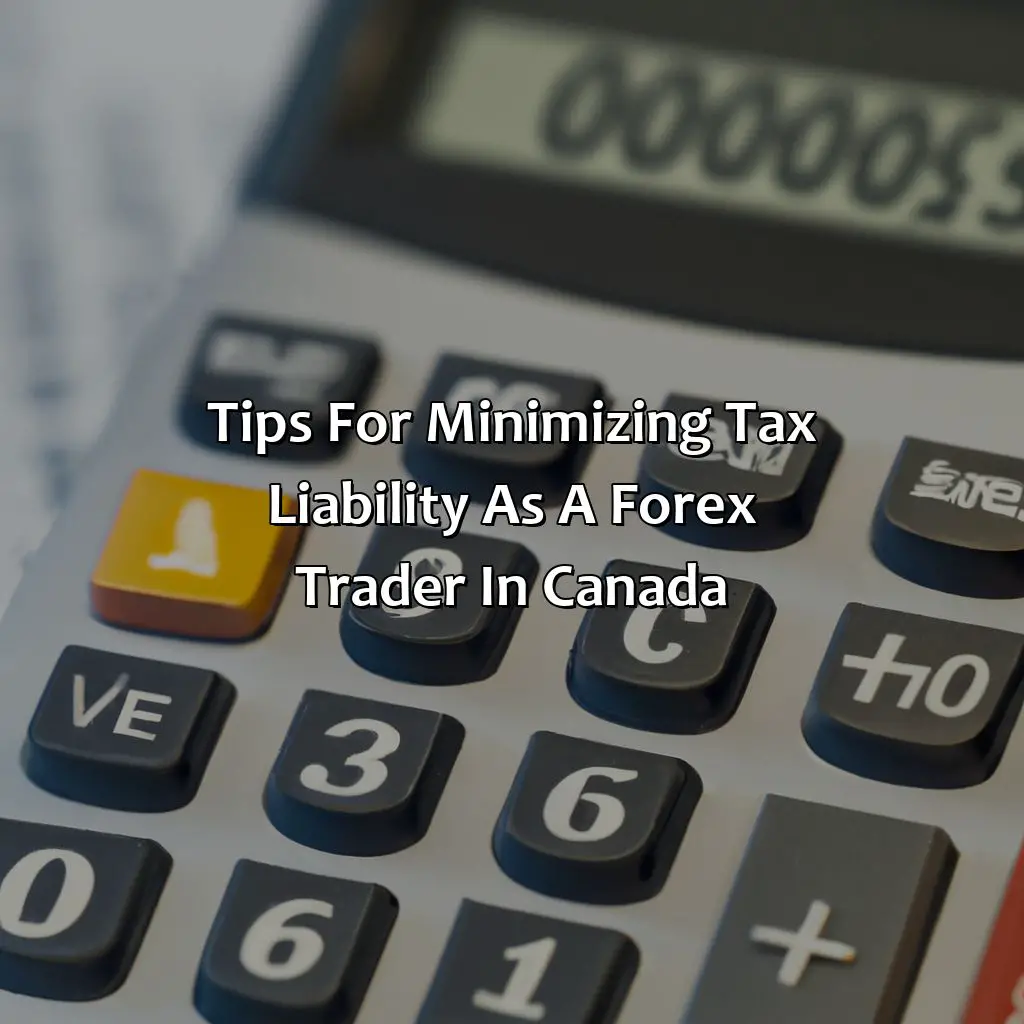
Photo Credits: forexbrokerreport.com by Carl Hall
Minimizing tax liability as a Forex trader in Canada? Let’s look at the solutions! Tax-planning strategies can reduce taxes. Knowing the investment strategies and financial planning can help. Plus, being aware of the tax implications of earning income abroad or working abroad is key. Professional tax advice? That’s a great idea for tax planning and investments.
Tax Planning Strategies for Forex Traders
Effective Financial Management for Forex Traders in Canada
Forex trading can provide significant returns to traders, but it also comes with tax implications. Tax planning strategies for forex traders in Canada are crucial to identify effective investment strategies and minimize liabilities. Traders must understand the nuances of Canadian tax laws to make informed decisions.
One important consideration is the tax implications of earning income abroad as a trader. Forex traders must legally report their income from trading on their Canadian tax returns. Therefore, financial planning should be done in such a manner that ensures maximum deductions permissible by law while having ample documentation maintained consistently.
It’s also important to consider tax implications of working abroad when planning ahead financially and getting professional advice is recommended.
Traders can maximize deductions by minimizing taxable gains through the use of capital losses carry-over. They should also take advantage of deductible expenses including office rent, communication costs, software subscriptions and other costs incurred while conducting trades.
Furthermore, seeking professional advice from a licensed accountant or tax preparer can provide valuable insights into how to lower taxes owed come filing time.
Lastly, being aware of any changes in Canadian tax laws- regardless how small – and adhering to record-keeping best practices set out by these regulations ensures that an individual will not have any surprises come tax season.
Overall, good financial management practices can help individuals optimize profits from the forex market while adhering firmly to applicable Canadian laws around taxes for individuals engaged in investment portfolios worldwide. Get the right tax advice to avoid forex trading becoming a tax nightmare and turn it into a tax-efficient investment strategy.
Seeking Professional Tax Advice
Experienced forex traders in Canada often seek expert tax advice to ensure they’re compliant with government regulations and maximize their tax planning opportunities. Professional tax advisors can provide valuable insight into complex tax laws, recommend tax-efficient investments and help traders file accurate tax returns.
By seeking professional tax advice, forex traders can tailor their financial strategy to minimize their overall tax liability. Tax advisors can work closely with traders to identify deductible expenses, ensure proper record-keeping practices are in place and recommend strategies for reporting income on tax returns.
It’s important for forex traders to understand that there are significant risks associated with non-compliance, including costly fines and penalties. Seeking the guidance of a professional is a wise move for any investor looking to navigate the complexities of taxation laws.
In some cases, heavily regulated industries such as forex trading may require specialized expertise from experienced professionals. By partnering with a reputable accountant or financial planner who specializes in forex trading taxation, investors can enjoy all the benefits of seasoned advice and expert guidance on how best to manage their finances and file their taxes appropriately.
Some Facts About Forex Trading and Taxes in Canada:
- ✅ Forex trading income is subject to taxation in Canada. (Source: Canada.ca)
- ✅ Forex traders in Canada are required to keep detailed records of their trading activity and income for tax purposes. (Source: Wealthsimple)
- ✅ It is important for forex traders in Canada to understand the tax implications of different trading strategies, such as day trading vs. long-term investing. (Source: TurboTax)
- ✅ Forex traders in Canada may be eligible for certain tax deductions and credits related to their trading activity. (Source: The Balance)
- ✅ Forex traders in Canada who are unsure about their tax obligations should seek the advice of a qualified tax professional. (Source: FXCM)
FAQs about Do Forex Traders Pay Tax In Canada?
Do forex traders pay tax in Canada?
Yes, forex traders in Canada are required to pay taxes on their profits from forex trading. Forex trading falls under the category of capital gains and losses, which are subject to taxes.
What is Schedule 3 and how does it affect forex traders?
Schedule 3 is a form that forex traders in Canada have to fill out and submit along with their tax return. This form is used to report any capital gains or losses from forex trading, as well as any other investments that the trader may have. It is important for forex traders to accurately fill out this form in order to avoid any penalties or fines.
Can forex traders deduct interest charges on their margin account from their taxes?
Yes, forex traders in Canada can deduct interest charges on their margin account from their taxes. This is because interest charges on margin accounts are considered to be a cost of carrying on the business of trading, and are therefore deductible.
Should forex traders seek the help of a tax professional to file their taxes?
Yes, it is recommended that forex traders in Canada seek the help of a tax professional when filing their taxes. Tax laws can be complex and may vary depending on the individual trader’s circumstances. A tax professional can help ensure that the trader is complying with all tax laws and receiving all the deductions they are entitled to.
What happens if a forex trader fails to report their forex profits on their taxes?
If a forex trader in Canada fails to report their forex profits on their taxes, they may be subject to penalties and fines. In some cases, the Canada Revenue Agency (CRA) may also conduct an audit and require the trader to pay back taxes owed, with interest.
Can forex traders claim losses on their taxes?
Yes, forex traders in Canada can claim losses on their taxes. Losses from forex trading can be used to offset gains from other investments, which can help reduce the trader’s overall tax liability.


